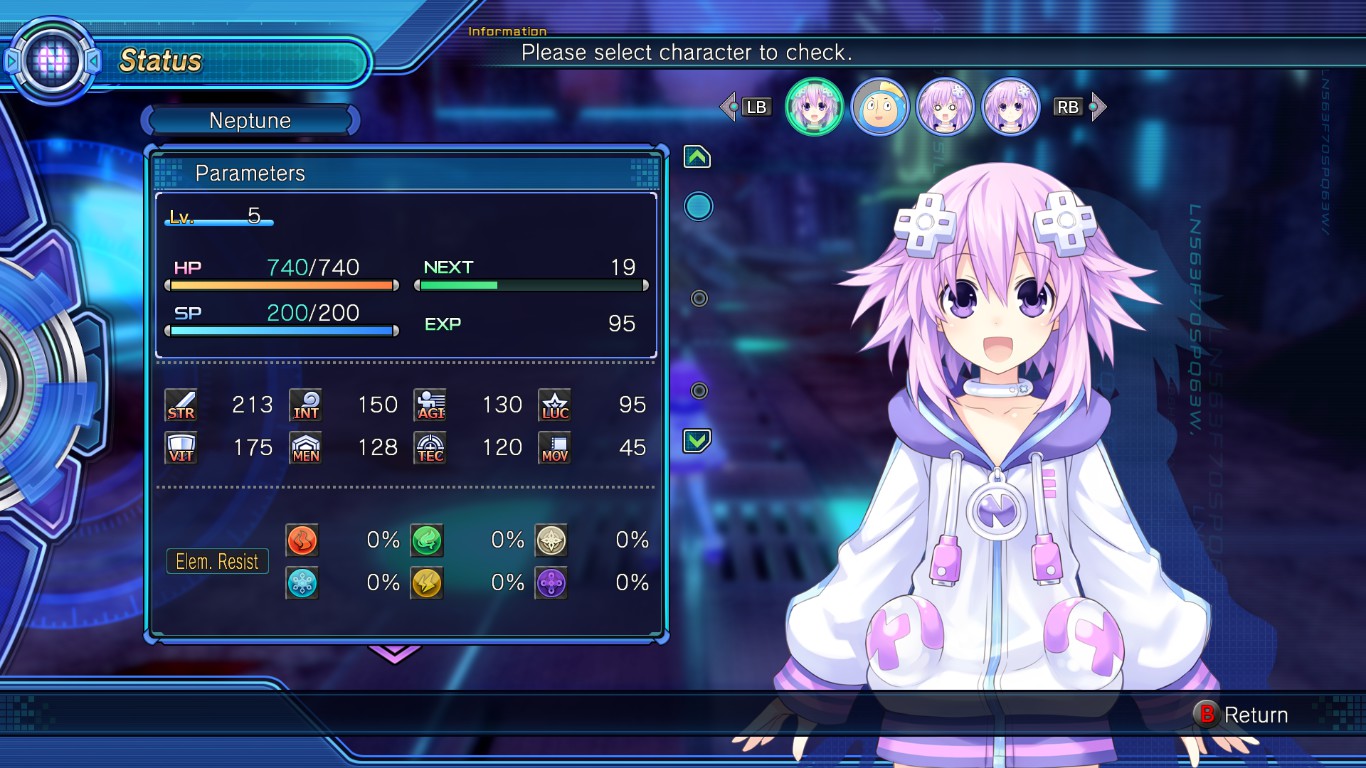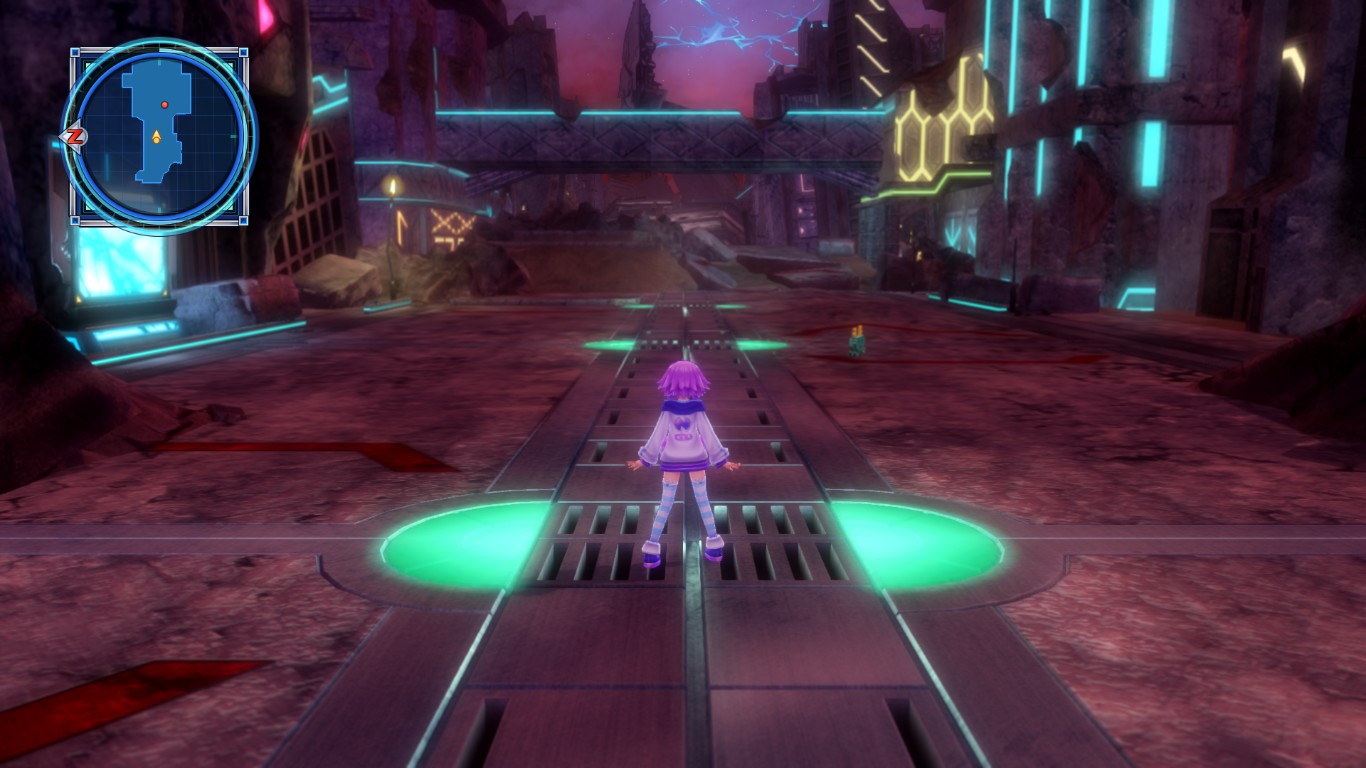Search
[{{{type}}}] {{{reason}}}
{{/data.error.root_cause}}{{{_source.title}}} {{#_source.showPrice}} {{{_source.displayPrice}}} {{/_source.showPrice}}
{{#_source.showLink}} {{/_source.showLink}} {{#_source.showDate}}{{{_source.displayDate}}}
{{/_source.showDate}}{{{_source.description}}}
{{#_source.additionalInfo}}{{#_source.additionalFields}} {{#title}} {{{label}}}: {{{title}}} {{/title}} {{/_source.additionalFields}}
{{/_source.additionalInfo}}- Details
- Category: Computer
- By Daniel Cullen
- Hits: 1157
Megadimension Neptunia VII (PC)

Megadimension Neptunia VII
Developed By: Idea Factory, Compile Heart
Published By: Idea Factory International
Released: July 5, 2016
Available On: Microsoft Windows, PlayStation 4, Switch
Genre: Turn-based RPG
ESRB Rating: Teen (Fantasy Violence; Language; Partial Nudity; Suggestive Theme)
Number of Players: Singleplayer
Price: $19.99
(Humble Store Link)
Note: This review will be based on stock game content minus DLC. However, do bear in mind the "Million Arthur" DLC content is no longer legally available due to the expiration of licensing agreements as of the time of this writing.
Oddly named sequels can be either good or bad. In the case of Megadimension Neptunia VII (abbreviated to MDM VII), this game is head and shoulders above Re;Birth 3 in almost every regard, though it's not without some technical issues.
First, some confusion needs to be cleared up. The title is saying V2, as in the second V game (Re;Birth 3 is a remake of Hyperdimension Neptunia Victory). Unfortunately, the title confusingly looks like the Roman numeral VII, or "seven". Also, despite canonically taking place after Re;Birth 3, it has hardly any reference to its events despite a similar dimension-hopping premise.
The game story is split into three parts. The first takes place before the "CPU Shift" period. While preparing for this event, series protagonist Neptune and her sister Nepgear are warped via a bizarre-looking game console to the "Zero Dimension", an apocalyptic reality where the threat of the Dark CPU looms. The second part is set during the CPU Shift period where the leaders of Gamindustri (the titular CPUs) are replaced by an event that puts new leaders called the "Gold Third" in power. The second part is about discovering the reasons for this and who is manipulating it for their own ends. The final arc of the game is about finding the true mastermind who has been manipulating everyone from the first two arcs and saving not one but three universes from destruction.
The standard gameplay is as typical for the canon Neptunia RPG games. It is a turn-based 3D RPG with most of the classic elements one expects of the role-playing genre. It has dungeons to explore, equipment to acquire, and various other sidequests.
My only complaints are the second arc of the game has an uneven learning curve, being rather hard early on with limited access to many characters until the individual segments of the second arc end. Without the DLC assist characters, which do make many of the arcs easier, the difficulty will be quite high. The second arc also has some very obtuse requirements to unlock the true ending that are very hard to figure out intuitively.

Strong Points: Best music, graphics, and story of all the canonical Neptunia RPG games; relatively few assets reused compared to prior titles
Weak Points: Bad and true endings have obtuse conditions; high learning curve on the second arc of the game at first
Moral Warnings: RPG-style violence; a scene or two of implied torture; some mild PG-13 language on rare occasions (b**t**d); sexual comments and some hot springs-style partial nudity; rather disturbing occult-style human sacrifice-esque arc and some implications of demons being real; easy to get the bad ending with little moral forewarning
Graphically, this game is a huge break from the liberal asset recycling from the prior games. On top of far more creative dungeon setpieces, very little recycled graphics (nigh everything was redrawn), and a lot more creative use of 3D (with some battles even taking place on multiple levels of height unlike prior games) make this game very visually stunning. Character models and animation aren't too different from prior games, though they did receive some touchups and animation tweaks to look very good in the MDM VII engine as well. Sounds and music have seen a boost in quality from the prior games, and are at their highest level of quality seen in the series thus far. The soundtrack has some glorious techno, orchestral, and vocal pieces, and frankly, my jaw was on the ground compared to the prior titles, which tended towards a lot of recycled synthesized and instrumental pieces. Sound effects aren't too different from prior titles, nor is the voice acting, but the higher-quality engine certainly gives them a high degree of fidelity. Both the English and Japanese voice acting is quite good as well. Like prior Neptunia games, it can be controlled with a keyboard and mouse or by a controller. Like those games, I also highly recommend a controller; playing on the keyboard and mouse is difficult at best. Any Steam-compatible controller will work fine. The stability for this title is fine on Windows. Granted, it's not a game I recommend trying to coast by on absolute minimum hardware requirements for at all. Being somewhat over the minimum is recommended for the best experience since this game has a much higher-quality engine with much higher needs than the prior games. As for Linux and the Steam Deck, not only is this unsupported, even custom Proton builds have a highly unstable experience at best trying to render this with any degree of stability. Morally, there is some concerning content. Violence is generally not much worse than RPG-style "give orders and watch it happen" combat, minus blood and gore. There is a scene or two of implied torture, but that's generally the worst of it. Language stays pretty far on the shallow end of the Teen rating with anything stronger than b**t**d being nigh unheard of. Sexual dialogue is also on the low end for the most part, aside from a few cracks about bust sizes between two of the main characters who have a rivalry over that sort of thing. There are comments in the clear negative about lolicon (sexualized depictions of very young girls), with one character making a special point to denounce it.

Higher is better
(10/10 is perfect)
Game Score - 92%
Gameplay - 18/20
Graphics - 9/10
Sound - 9/10
Stability - 5/5
Controls - 5/5
Morality Score - 60%
Violence - 6/10
Language - 7/10
Sexual Content - 4/10
Occult/Supernatural - 3/10
Cultural/Moral/Ethical - 10/10 (+3 for a good moral about not letting your vices control you)
Being a game with a highly female cast, there are some revealing outfits and a few hot springs-styled partial nudity scenes, albeit with the essentials censored. There is some implied lesbianism, but this is shown to be rather disturbing in the implications and generally not viewed positively nor reciprocated. There are a few joking references to male homosexuality that don't go anywhere beyond that. They do imply a female character might be bisexual in a once-off joke as well. Ordinarily, Neptunia is a game with a high sci-fi, digital world premise, though one arc of the game does dip into a few occult-like moments, like a pseudo-human sacrifice arc. Said arc is aborted before anyone is sacrificed for real, but has enough of the tropes and trapping of things from even more serious media of that nature to be quite concerning. There is some portrayal of beings that look undead/demonic, and unlike prior Neptunia games, where they were explicitly digital constructs, some are implied or stated to be quite real. The overarching villain is also something of a Devil-like figure, specifically in corrupting and deceiving the cast whenever they can. Morally and ethically, there are not too many issues with authority, as most of the playable characters are authority figures or those allied with them. There are some rebellions against clearly corrupt and/or illegitimate authority, with more ethical and honorable things put in their place. Finally, there is a commendable running theme of not letting yourself be controlled by your darker impulses, and instead accepting and overcoming them for your own sake and that of others, with this playing a vital role in the resolution of the latter arcs especially. One final note. There are three endings in the game. While the true ending is a bit obtuse and requires a guide to get done, the bad ending is curiously easy to get. Further, no explicit warning is given for doing certain actions that will result in this terrible ending, nor is there any clear moral penalty for neglecting to view a few scenes on which this bad ending hinges on you not seeing. The normal ending will generally be reached by most players on their first playthrough and has no moral issues with getting it. Overall, Megadimension Neptunia is a pretty good RPG and one of the finest Neptunia games out thus far. Morally, it has some concerning issues like almost any other Neptunia game and is not recommended for anyone who is not an older teenager bare minimum. If purchased on sale, it's worth getting.




